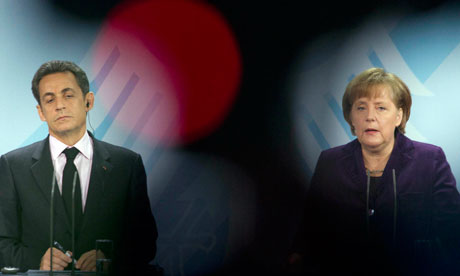Germany and France have raised the pressure on Greece to a find a solution to its debt crisis, warning that the country will be denied a crucial €130bn (£107bn) bailout unless it can reach an agreement with its bondholders.
Speaking after a meeting with France's president, Nicolas Sarkozy, Angela Merkel said: "We must see progress on the voluntary restructuring of Greek debt."
The German chancellor added: "From our point of view, the second Greek aid package including this restructuring must be in place quickly. Otherwise it won't be possible to pay out the next tranche for Greece."
Under the terms of the second bailout, investors are being asked to write down 50% of the value of their holdings of Greek government bonds although there has been speculation that the size of this writedown may yet increase.
Sarkozy called the situation in the eurozone "very tense" after his first meeting with Merkel in 2012 and ahead of crucial meetings in Italy before the full EU summit on 30 January. "The situation is tense, perhaps more so than ever in the eurozone's history," he said.
The leaders' emphasis on the need to find a solution to the Greek crisis rattled markets, which had started 2012 on an upbeat note. Germany's stock market was down 0.7%, France's 0.3% and the FTSE 100 index 0.7%.
The single currency, however, was slightly stronger after falling to 16-month lows against sterling last week.
In a sign of fragile sentiment, investors paid to lend money to Germany at its latest auction of €3.9bn in six-month bonds. Interest rates turned negative to -0.0122% during the auction, meaning investors were prepared to accept a small loss to keep their money safe for six months. Trading was in contrast to November, when Germany failed to attract as much demand as it had hoped for its bonds, raising fears that investors were shunning Europe's paymaster.
Germany has now fared better than many of its neighbours in the eurozone. France paid a little more to raise short-term funds last week, while Spain faces a crucial test on Thursday when it aims to raise €5bn. Meanwhile, yields on 10-year Italian government bonds remain at levels close to 7% – regarded as unsustainable in the long term.
David Cameron, who has ruled the UK out of the EU treaty that Merkel and Sarkozy hope will help solve the crisis through greater fiscal union, waded in to urge eurozone leaders to take "pretty decisive steps" to keep the euro alive.
He is opposing the financial transaction tax that France and Germany appear to be willing to implement, although French banks, through the French Bank Federation, warned they might shift overseas if it were imposed.
Merkel insisted that no country should be forced out of the eurozone as Sarkozy stressed that the "fiscal compact" would be ready to allow a new treaty to be signed on 1 March.
The German leader, facing the prospect that the eurozone is falling back into recession, also stressed that growth was on the agenda. She said: "Budget consolidation is one of the legs Europe's future must be built on, but of course we need a second leg and that is ... the question of economic growth, jobs and employment."
The markets are awaiting news of any downgrade of France's triple-A debt rating, which is also crucial for the rating of the European Financial Stability Facility – Europe's bailout fund. Analysts at BNP Paribas noted that by 17 January, Moody's has to decide whether to change its outlook to "negative" on France. Its fellow rating agencies Standard & Poor's and Fitch have already warned of the risk of a downgrade.
Official data showed that Germany's trade surplus rose in November, demonstrating that the country was still able to keep its export market buoyant. France was also able to report higher exports in November, although imports were flat, shrinking its trade deficit.
Jane Foley, currency expert at Rabobank, said: "Better than expected German trade data is a reminder that for the eurozone the softer euro exchange rate is not all bad news".








